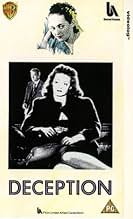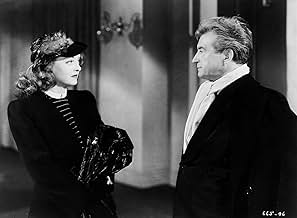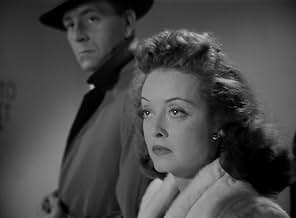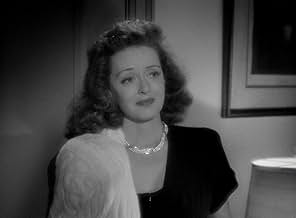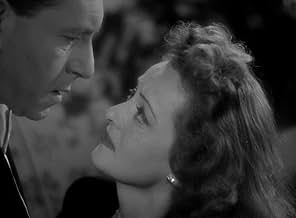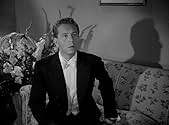CALIFICACIÓN DE IMDb
7.0/10
4.5 k
TU CALIFICACIÓN
Tras casarse con su amor perdido, un músico ve amenazada su relación por un rico compositor que está enamorado de ella.Tras casarse con su amor perdido, un músico ve amenazada su relación por un rico compositor que está enamorado de ella.Tras casarse con su amor perdido, un músico ve amenazada su relación por un rico compositor que está enamorado de ella.
- Dirección
- Guionistas
- Elenco
- Premios
- 4 premios ganados en total
John Alban
- Concertgoer
- (sin créditos)
Russell Arms
- Music Student
- (sin créditos)
Lois Austin
- Norma - Wedding Guest
- (sin créditos)
Patricia Barry
- Music Student
- (sin créditos)
Brandon Beach
- Concertgoer
- (sin créditos)
Lulu Mae Bohrman
- Restaurant Diner
- (sin créditos)
Paul Bradley
- Concertgoer
- (sin créditos)
James Carlisle
- Restaurant Diner
- (sin créditos)
Gertrude Carr
- Wedding Guest
- (sin créditos)
James Conaty
- Well-Wisher at Concert
- (sin créditos)
Marcelle Corday
- Hat Check Woman
- (sin créditos)
Gino Corrado
- Waiter
- (sin créditos)
Suzi Crandall
- Music Student
- (sin créditos)
- Dirección
- Guionistas
- Todo el elenco y el equipo
- Producción, taquilla y más en IMDbPro
Opiniones destacadas
If you're in the mood for a flamboyant Bette Davis-Claude Rains melodrama, you've got to see this one. Rains all but steals the film as the genius composer with some of the cruelest and wittiest lines ever uttered by this talented actor. Bette matches him with a finely controlled display of emotions and Paul Henreid is altogether convincing in a rather thankless role as her ex-lover who re-enters her life and incurs the wrath of Rains. For the cello concerto, Erich Wolfgang Korngold provides a robust, darkly thrilling piece of work that gets the full treatment toward the climax of the story. A very satisfying look at Davis and Rains at the peak of their powers. I love the comment by Cecilia Ager of PM who wrote: "It's like grand opera, only the people are thinner. I wouldn't have missed it for the world." If you're a Claude Rains fan--and there are MANY, MANY of them out there--you might have read my profile on his career in CLASSIC IMAGES, a long article with many photos that appeared in the December 2000 issue.
Irving Rapper's "Deception" reunited the three stars of a much better Bette Davis' vehicle: "Now Voyager". This is a film where all three stars shine equally. "Deception" was based on a play and the adaptation has opened it in unexpected ways. This satisfying melodrama has one thing going for it: the great music one hears throughout the movie, it's highlight being the Korngold Cello concerto, a rarity seldom heard, let alone in films. We are also treated to the beginning of Beethoven's Apassionata sonata as well.
Christine Radcliffe is a musician who gets separated from the love of her life, Karel Novak, one of the best cellist of Europe, before the advent of WWII. Christine comes back to New York, where she becomes the lover of a famous composer, Alexander Hollenius. One day, Christine discovers Karel's name playing in a second class venue in Manhattan, where they are reunited.
Christine doesn't have the nerve to tell Karel about what has happened in the intervening years. It's obvious Christine has done well for herself, as Karel discovers Christine lives in a great apartment, he finds closets full of elegant and expensive clothes, furs, jewelry, which doesn't make sense to him. Little does he know everything has come out of the generosity of Alexander Hollenius, a composer that fell in love with Christine and obviously, became her lover. Christine is coy in not revealing the truth, which keeps interfering with her happiness, until it comes to a head as Hollenius threatens Christine to tell it all to Karel after he plays the concert. It's at that point that Christine realizes she is cornered and must face reality and the fact that she will lose the man she really loves.
Bette Davis made a fine Christine, a woman she was born to play. Ms. Davis is amazing in the film, which unfortunately, is forgotten by all her admirers when comparing this role to her other great screen portraits. Claude Rains, who worked so well with Ms. Davis, gives an incredible performance as the egotistical composer who is afraid to lose his own creation. This has to be one of Mr. Rains' best appearances in a film. Paul Henried is perfect as Karel, the European cellist madly in love with Christine, a woman he thought he had lost forever. Mr. Henried is an elegant figure in this film, something that he projected effortlessly.
Ernest Haller's cinematography greatly enhances all we see on the screen. Mr. Haller was one of the best photographers working in that period, as he clearly shows here. George James Hopkins' sets not only are opulent, but he clearly knew how to get the most of his interior designs.
The film is an engrossing tale that will satisfy the fans of this genre.
Christine Radcliffe is a musician who gets separated from the love of her life, Karel Novak, one of the best cellist of Europe, before the advent of WWII. Christine comes back to New York, where she becomes the lover of a famous composer, Alexander Hollenius. One day, Christine discovers Karel's name playing in a second class venue in Manhattan, where they are reunited.
Christine doesn't have the nerve to tell Karel about what has happened in the intervening years. It's obvious Christine has done well for herself, as Karel discovers Christine lives in a great apartment, he finds closets full of elegant and expensive clothes, furs, jewelry, which doesn't make sense to him. Little does he know everything has come out of the generosity of Alexander Hollenius, a composer that fell in love with Christine and obviously, became her lover. Christine is coy in not revealing the truth, which keeps interfering with her happiness, until it comes to a head as Hollenius threatens Christine to tell it all to Karel after he plays the concert. It's at that point that Christine realizes she is cornered and must face reality and the fact that she will lose the man she really loves.
Bette Davis made a fine Christine, a woman she was born to play. Ms. Davis is amazing in the film, which unfortunately, is forgotten by all her admirers when comparing this role to her other great screen portraits. Claude Rains, who worked so well with Ms. Davis, gives an incredible performance as the egotistical composer who is afraid to lose his own creation. This has to be one of Mr. Rains' best appearances in a film. Paul Henried is perfect as Karel, the European cellist madly in love with Christine, a woman he thought he had lost forever. Mr. Henried is an elegant figure in this film, something that he projected effortlessly.
Ernest Haller's cinematography greatly enhances all we see on the screen. Mr. Haller was one of the best photographers working in that period, as he clearly shows here. George James Hopkins' sets not only are opulent, but he clearly knew how to get the most of his interior designs.
The film is an engrossing tale that will satisfy the fans of this genre.
Deception (1946)
A marvelous chamber piece, in a way, involving orchestral music. The cast begins with two principals, played with usual intensity by Bette Davis and with usual restraint by Paul Henreid. This broods a bit and suggests trouble, and then comes the third player, who outdoes them both, in the form of Claude Rains. The rest of the movie is an interplay between the three, a push and pull and game of dodging and, of course, deception.
So how to judge this kind of tightly woven enterprise? It feels as though William Wyler could have directed it, so polished and rich it all is. But this is a Warner Brothers drama, so there is another kind of layer of dark danger, and of a noir inspired lighting and camera-work. This visual aspect, in a way, is the real star of the film, which says a lot, considering the high level of acting involved.
In all it's purely an entertainment, but at the highest level. The backdrop of classic music and classical musicians hasn't worn well over the years, but I grew up with this kind of scene and it brought back a lot of those vibes. A terrific movie within its own genre.
A marvelous chamber piece, in a way, involving orchestral music. The cast begins with two principals, played with usual intensity by Bette Davis and with usual restraint by Paul Henreid. This broods a bit and suggests trouble, and then comes the third player, who outdoes them both, in the form of Claude Rains. The rest of the movie is an interplay between the three, a push and pull and game of dodging and, of course, deception.
So how to judge this kind of tightly woven enterprise? It feels as though William Wyler could have directed it, so polished and rich it all is. But this is a Warner Brothers drama, so there is another kind of layer of dark danger, and of a noir inspired lighting and camera-work. This visual aspect, in a way, is the real star of the film, which says a lot, considering the high level of acting involved.
In all it's purely an entertainment, but at the highest level. The backdrop of classic music and classical musicians hasn't worn well over the years, but I grew up with this kind of scene and it brought back a lot of those vibes. A terrific movie within its own genre.
Bette Davis believed her true love Paul Henreid was killed in battle. When he returns, their romance is rekindled But during the time he was believed dead, Bette had become involved with composer Claude Rains. Claude's not very happy losing her to Henreid. So Bette must take steps to ensure he doesn't ruin their happiness.
Paul Henreid is the weak link in this dynamic trio of stars. But, to be fair, he doesn't have the juiciest part. Bette is at her soap operatic best here, serving up her role with a hefty side of ham. Claude Rains owns every scene he's in. Like Bette, the man knew his way around a melodramatic role. Unlike Bette (usually), Rains could keep from going over-the-top. He's a better actor, quite frankly. But stars like Bette Davis and Joan Crawford aren't beloved for their realistic acting. People like them for their enjoyable excesses. They were the precursors to the television soap opera stars that would come decades later.
Wonderful sets and costumes, filmed beautifully. Glamorous production from Warner Bros. Loved the Erich Wolfgang Korngold score, as well as the other classical pieces featured. It's a fine melodrama with touches of film noir. Great performances from Davis and Rains. Fans of both will enjoy this one.
Paul Henreid is the weak link in this dynamic trio of stars. But, to be fair, he doesn't have the juiciest part. Bette is at her soap operatic best here, serving up her role with a hefty side of ham. Claude Rains owns every scene he's in. Like Bette, the man knew his way around a melodramatic role. Unlike Bette (usually), Rains could keep from going over-the-top. He's a better actor, quite frankly. But stars like Bette Davis and Joan Crawford aren't beloved for their realistic acting. People like them for their enjoyable excesses. They were the precursors to the television soap opera stars that would come decades later.
Wonderful sets and costumes, filmed beautifully. Glamorous production from Warner Bros. Loved the Erich Wolfgang Korngold score, as well as the other classical pieces featured. It's a fine melodrama with touches of film noir. Great performances from Davis and Rains. Fans of both will enjoy this one.
One of the few actors of Bette Davis' time who could match her screen intensity was Claude Rains. Paul Henreid is paired with Davis as her true love for another convincing romance. But, the script-stealing scene is between Davis and Rains. Matched penultimately perfect for the picture, Davis and Rains match each other's most intense acting skills during a major bedroom blow-out between them. I live to watch that scene over and again for its acting mastery.
Since Deception is about three classical music artists, the classical music score makes Deception's choice script musically enhanced to a classy degree. I love how Rains takes "the 4th Warner Brother's" acting intensity and levels it with his own. Even Bogie couldn't do that when staged with Davis! Don't miss this tightly wound triangulation with Henreid underplaying himself as his role calls for.
Since Deception is about three classical music artists, the classical music score makes Deception's choice script musically enhanced to a classy degree. I love how Rains takes "the 4th Warner Brother's" acting intensity and levels it with his own. Even Bogie couldn't do that when staged with Davis! Don't miss this tightly wound triangulation with Henreid underplaying himself as his role calls for.
¿Sabías que…?
- TriviaPaul Henreid could not play the cello. While he was able to fake it in the long shots, to achieve the illusion in closeup, he wore a special jacket with no sleeves and holes for two real cellists to insert their arms - one to bow, and one to accurately finger the music - while seated behind him, out of shot.
- ErroresWhile Christine, alone in her studio, is talking to Alexander Hollenius on the telephone, the highly visible shadow of a crew member is moving back and forth across the piano behind her.
- Citas
Alexander Hollenius: [snatches his bleeding hand away from Christine] Like all women - white as a sheet at the sight of a couple of scratches... calm and smiling like a hospital nurse in the presence of a mortal wound... Good night!
- ConexionesEdited into Cliente muerto no paga (1982)
- Bandas sonorasHollenius' Cello Concerto
Music by Erich Wolfgang Korngold
Performed by Paul Henreid (dubbed by Eleanor Slatkin)
Selecciones populares
Inicia sesión para calificar y agrega a la lista de videos para obtener recomendaciones personalizadas
- How long is Deception?Con tecnología de Alexa
Detalles
- Tiempo de ejecución1 hora 55 minutos
- Color
- Relación de aspecto
- 1.37 : 1
Contribuir a esta página
Sugiere una edición o agrega el contenido que falta





